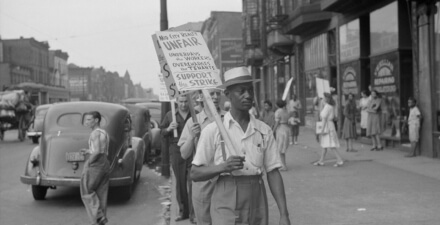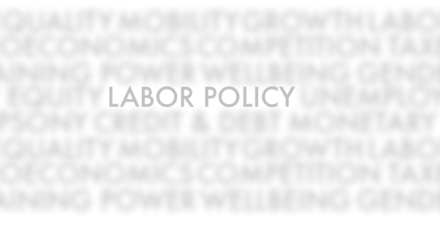Increasing evidence demonstrates the ways in which bargaining power shapes economic outcomes. One’s economic success is not merely defined by individual characteristics such as education. Equitable Growth’s work on unions and collective action in the United States examines the ways in which institutions intersect with economic trends and individual characteristics to ensure that workers can share in the gains of the economic growth to which they contribute.
Featured work
Will labor’s surging popularity result in new union members in the United States?
August 29, 2024
August 29, 2024
Unions in the United States improve worker safety and lower health inequality
December 13, 2022
December 13, 2022
Factsheet: How strong unions can restore workers’ bargaining power
May 1, 2020
May 1, 2020
Unions and the enforcement of labor rights: How organized labor protects U.S. workers against unfair and illegal employment practices
April 29, 2022
April 29, 2022
Aligning U.S. labor law with worker preferences for labor representation
February 18, 2020
February 18, 2020
Explore Content in Bargaining Power390
Equitable Growth renews collective bargaining agreement with Nonprofit Professional Employees Union
October 7, 2024
October 7, 2024
Estimating the prevalence of automated management and surveillance technologies at work and their impact on workers’ well-being
October 1, 2024
October 1, 2024
Will labor’s surging popularity result in new union members in the United States?
August 29, 2024
August 29, 2024
Worker Led Lawsuits: The Effects of California’s Private Attorney Generals Act
August 27, 2024
August 27, 2024
New federal heat standard will protect U.S. workers from the ill effects of high temperatures amid intensifying climate change
August 1, 2024
August 1, 2024
New federal heat standard offers novel distributional analysis to determine which workers benefit and how
July 16, 2024
July 16, 2024
A researcher’s guide to identifying policy-relevant research questions for the federal government
May 30, 2024
May 30, 2024
New workplace surveillance bill would protect U.S. workers and address new technological risks
May 2, 2024
May 2, 2024
Request for Proposals: How effective was the fiscal response to the COVID-19 recession for workers?
March 18, 2024
March 18, 2024
Equitable Growth hosts State of the Union press briefing with leading U.S. economists
March 7, 2024
March 7, 2024
The state of the U.S. labor market 4 years after the start of the COVID-19 recession
March 5, 2024
March 5, 2024
Request for proposals: Research grants for early career scholars
November 30, 2023
November 30, 2023
Explore the Equitable Growth network of experts around the country and get answers to today's most pressing questions!

















